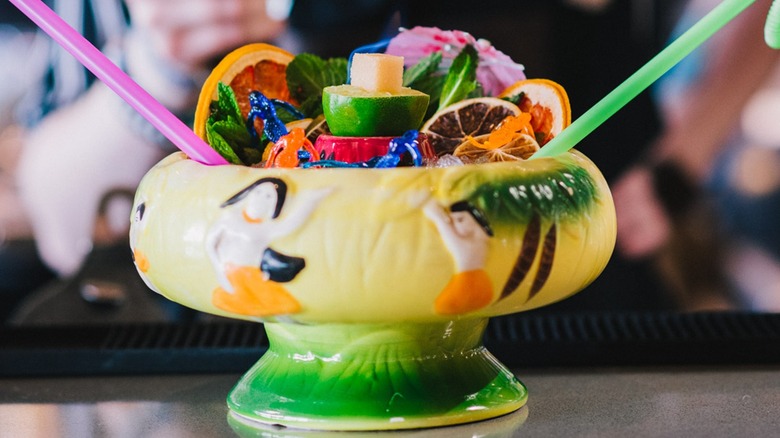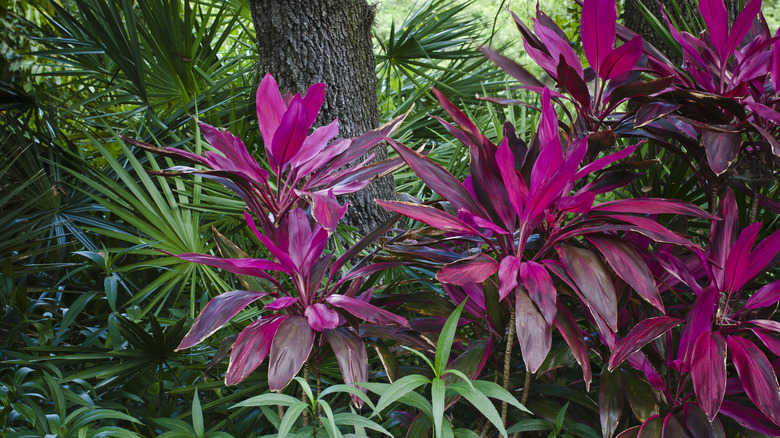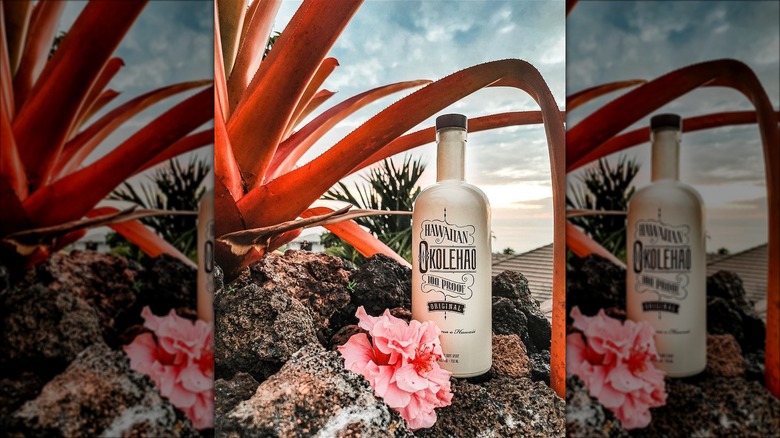The Original Scorpion Cocktail Was Made With A Rare Hawaiian Spirit
Victor "Trader Vic" Bergeron built an empire on tiki culture. The iconic hospitality entrepreneur, and founder of Trader Vic's, tapped into mid-20th-century America's fascination with a hyper-kitchy interpretation of exotic South Seas island life. Along the way, Bergeron introduced legions of cocktail lovers to the joys of fruity, rum-forward drinks like the Mai Tai. While a few were originals, many of Trader Vic's cocktails were interpretations of existing libations or concoctions based on legend and hearsay. Such is the case with the Scorpion, a dramatic presentation of flaming spirits often served as a communal cocktail for up to four people.
While the genesis of the Scorpion, or at least Trader's Vic's interpretation of the libation, is subject to debate, cocktail historians tend to agree it's loosely based on a drink Honolulu's original beach boys — a band of Waikiki surfers who became unofficial cultural ambassadors catering to old-world Hollywood elite — made for island visitors. The original was made with Okolehao, a Hawaiian spirit made by distilling the roots of a ti plant.
In 2018, Daily Beast chronicled early references to the drink that likely inspired Trader Vic's Scorpion, pointing to a 1938 column by Honolulu gossip reporter Waikiki Willie (aka Francis T. King) who wrote about a local soiree that featured "some of those only too well known scorpions, three gallons of them." A few days later, island society reporter Jane Howard revealed the ingredients: sugar, mint, oranges, lemons, and Okolehao. Mash everything together. Let the blend ferment for a few days. Strain and serve over crushed ice.
The tea on the ti-based spirit
Okolehao (aka Oke) is hard to find. By some accounts, seafaring traders introduced the ti plant, which is native to Polynesia) plant to the Hawaiian islands in the 18th century. Another legend suggests William Stevenson, a British convict who escaped exile in Australia, taught native Hawaiians how to distill ti root to produce the alcoholic beverage. It became so popular that in an effort to stem overindulgence King Kamehameha I outlawed the consumption of alcoholic spirits. Fifteen years later, in 1833, his successor Kamehameha III repealed the law. In the interim though, locals had become adept at home-stilling the ti-based moonshine, a skill that kept the native spirit flowing right through 20th-century Prohibition. (Yes. It applied even though Hawaii had yet to become a U.S. state.) But just as World War II forces were returning home from the Pacific with fanciful tales of exotic island living, easy access to alternatives like rum and vodka shifted focus away from the local favorite before it garnered widespread interest on the mainland.
The downturn lasted for decades, putting credible island distilleries out of business. Low-end producers continued to turn out cheap knockoffs to satisfy tourist demand for souvenirs, but authentic Okolehao faded into memory, which is probably why — regardless of its provenance or real-world inspiration — Trader Vic's mid-20th-century version of the Scorpion featured a combo of rum, gin, and brandy instead of Okolehao.
Okolehao is making a comeback
In 2012, Oahu's Island Distillers brought a 21st-century incarnation of Okolehao to market. Driven by a desire to resurrect the all-but-forgotten element of Hawaii's history, and perhaps as a reminder that the syrupy knock-off swill that had been passing for Okolehao was far inferior to the authentic Hawaiian moonshine, Island Distillers founder and owner Dave Flintstone spent five years researching the native spirit. "My goal with Hawaiian Okolehao was to reintroduce a 19th-century spirit," Flintstone told Punch in 2019. "The myth and lore of [Okolehao] intrigued me for years. It took a while, and a lot of research, to recreate what was being consumed in the mid-1800s."
So far, Island Distillers' Okolehao has been well received locally. Flintstone told Punch he's heard positive things from both bartenders and tiki enthusiasts, but the spirit itself remains a bit of an enigma. To date, it's only distributed in Hawaii, so that makes tasting and experimenting with recipes a challenge for mainlanders. Plus, it kind of defies definition. "It is not vodka, not rum, not whiskey," Flintstone told Punch. "It is in a category all its own." For now, we can only hope authentic Okolehao will eventually make an impression beyond the Aloha State — and make its way into Scorpion Bowls everywhere. In the meantime, we'll have to make do with Trader Vic-esque interpretations of the butt-kicking cocktail while pondering the English translation of Okolehao — "iron buttocks." It's certainly something to think about.


